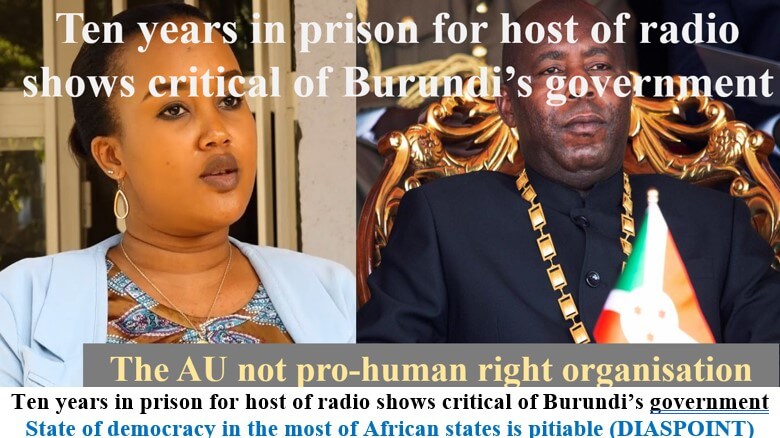Ten years in prison for host of radio shows critical of Burundi’s government
Reporters Without Borders (RSF) condemns the “harsh and arbitrary” ten-year prison sentence that the host of a Rwanda-based web radio critical of the Burundian government received last week on a spurious charge of “endangering the integrity of the national territory” at the end of a grossly unfair trial before a Burundian court.
Radio Igicaniro host Floriane Irangabiye was convicted on 3 January under article 611 of Burundi’s criminal code, a “vaguely-worded article usually used to convict mercenaries,” her lawyers said. As well as being sentenced to ten years in prison, she was fined 1 million Burundian francs (about 450 euros).
Trumped-up charges
The grounds for this charge were never clarified and were clearly baseless. Her lawyers, who intend to appeal within 30 days, insist that there is no evidence that her broadcasts from neighbouring Rwanda, which often included criticism of the Burundian authorities, posed any threat to Burundi’s internal security.
The prosecution also accused her of being “unable to produce a press card while claiming to be a journalist.” Since 1 December, a press card has been a requirement for all journalists working in Burundi. But Irangabiye did not work in Burundi and was visiting family when she was arrested in Bujumbura, the Burundian capital. Furthermore, her radio station is not recognised by Burundi’s National Council of Communication, the only body that issues the press card.
This harsh sentence is extremely disturbing and shows that the authorities targeted Floriane Irangabiye because of her work as a journalist. This deplorable attack on press freedom sends a message designed to silence all critical journalists. The authorities have been unable to produce any hard evidence to support the spurious charges. This court’s decision must be overturned and this journalist must be released immediately.
Sadibou Marong
Director of RSF’s sub-Saharan Africa bureau
Held for months without charge
Irangabiye had been living in Rwanda since 2015, where she hosted shows on Igicaniro, a web radio created by Fraternité, an association of Burundians living in self-exile, mainly in Rwanda. She regularly invited well known Burundian figures – often government critics – onto her shows to discuss the country’s problems.
While visiting her family in Burundi, she was arrested on 30 August 2022 by the National Intelligence Service, which takes its orders directly from the president. She was initially held without charge for a month in Bujumbura’s Mpimba prison. But then, without any prior warning and without any grounds, she was transferred one night at the start of October from Bujumbura, which is in the west of the country, to Muyinga prison in the far northeast. She was finally charged after being held for two months and was produced in court on 16 December.
She continues to be held in a remote prison where most of the detainees are from the region and she is far from her family and loved ones. This is a deliberate form of punishment, her lawyers told RSF. They also said her visitors are systematically subjected to body searches in order to deter them from visiting her.
Practicing journalism has been fraught in Burundi ever since a political crisis in 2015, when many journalists either fled the country or were put on trial and were given long jail sentences, devastating the country’s media landscape. Iwacu, Burundi’s most popular news website, began being blocked in 2017 but it was able to continue operating thanks to the various mirror sites created by RSF to circumvent the censorship. The authorities finally stopped blocking Iwacu last month. Source: rsf.org







